The Diving Bell and the Butterfly
 for nudity, sexual content and some language.
for nudity, sexual content and some language.
Reviewed by: Steven Warburton
CONTRIBUTOR
| Moral Rating: | Average |
| Moviemaking Quality: |
|
| Primary Audience: | Adults |
| Genre: | Biography Drama |
| Length: | 1 hr. 52 min. |
| Year of Release: | 2007 |
| USA Release: |
November 30, 2007; DVD: April 29, 2008 |
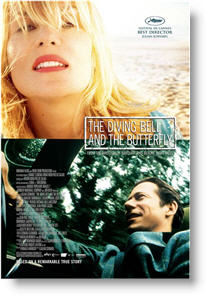
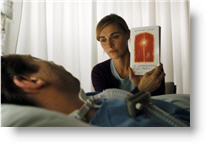

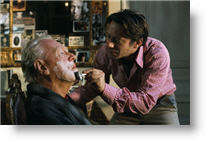
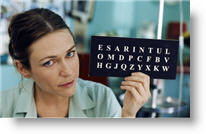

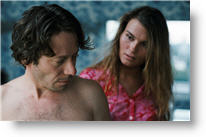


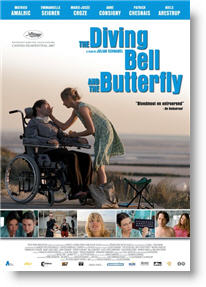
| Featuring |
|---|
|
Mathieu Amalric Emmanuelle Seigner Marie-Josée Croze Anne Consigny Patrick Chesnais Max von Sydow Lenny Kravitz See all » |
| Director |
|
Julian Schnabel |
| Producer |
| François-Xavier Decraene, Pierre Grunstein, Kathleen Kennedy, Jon Kilik, Jim Lemley |
| Distributor |
“Let your imagination set you free”
Here’s what the distributor says about their film: “Elle France editor Jean-Dominique Bauby, who, in 1995 at the age of 43, suffered a stroke that paralyzed his entire body, except his left eye. Using that eye to blink out his memoir, Bauby eloquently described the aspects of his interior world, from the psychological torment of being trapped inside his body to his imagined stories from lands he’d only visited in his mind. From a novel by Jean-Dominique Bauby.”
“The Diving Bell and the Butterfly” is an intelligent, well-made French movie that asks a difficult question: Would life still be worth living if your body was almost completely paralyzed?
As Christians, we believe that life is always worth living. We believe that God is sovereign, that he is able to glorify Himself through us no matter what our condition. This is something we all know on a theoretical level. In practice, however, would we still feel that way, or would we long for death?
The protagonist of this movie, which is based on a true story, finds himself in that exact situation. Jean-Mo, a 43-year old man who works as the editor of Elle, suffers a horrible stroke while in the prime of his life. His brain stem is destroyed. He cannot speak. Later, he reflects that there are only two parts of his body the stroke did not destroy—his imagination and his memory.
He is able to move his left eye. This gives his nurses an idea on how he can communicate. They will recite the alphabet to him and he will blink when they say the letter he desires. That way he can spell out words, sentences, paragraphs, even pages.
At first, he tires of the long repetitive process, but eventually he warms up to the idea that he may still have something to offer the world. He will write a book about his life.
Much of the story is told in flashback. Two of these scenes, as a Christian, were particularly interesting to me. In one, his nurse wheels him to church. He tells his audience that he is not a religious man and, at first, did not appreciate being wheeled into the sacristy. However, after meeting the priest and sensing the pure motives of his nurse, he seems to realize that there might be something much deeper in this kingdom of spirituality. However, this sequence is hardly an apologetic for Christianity. We see that other faith communities around the world—Buddhists, Muslims, Hindus, even a witch doctor in Africa—are petitioning their deities on his behalf.
The other flashback deals with a trip to Lourdes with a former paramour. While there, his girlfriend has him buy her an illuminated Madonna. He buys it, reluctantly. Later, lying in bed, he stares up at the Madonna staring at them and complains that he can’t make love with her watching. He asks to unplug it, and she refuses. Immediately, he decides to break up with her.
What I got from this, and the film in general, was the vast difference between how secular and faith communities often view such conditions. The world sees a life-crippling paralysis as devastating. (How many times have you heard someone say “if I ever wind up in that condition, please kill me?”) God, however, can use it for redemption. I was reminded of Joni Eareckson Tada, who’s been in a wheelchair for more than 40 years after a 1967 diving accident rendered her a quadriplegic. God has used her mightily as a Christian witness and an advocate for the disabled community. He could do the same for us.
Now there’s a chilling thought.
What is objectionable about the film: There are two quick flashes of a woman’s breasts and there is a brief shot of male nudity while Jean-Mo is being bathed in the hospital pool. (How this can be seen as erotic, however, is beyond me.) The profanity is tame by worldly standards, though “God” is used as an exclamation a number of times and “Christ” is used once.
But I think that’s it.
Violence: None / Profanity: Minor / Sex/Nudity: Mild
See list of Relevant Issues—questions-and-answers.


Moral rating: Extremely Offensive / Moviemaking quality: 2
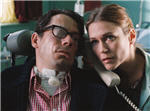

What is positive about this film, from a Christian point of view, is the amount of love bestowed upon this completely helpless and disabled human being. This is love for one’s neighbor at its finest. The movie does not judge his rather amoral personal life, but focuses on the difficulty of his disabled existence. We learn that he did not marry the mother of his children, and even leaves her for someone else. But he was from a society in which this is unfortunately commonplace.
Bauby’s father does chide him for not having married his children’s mother. The therapists who take care of him and help him write his story—he died 10 days after the publication of his book—encourage him to live even when he claims he does not want to live. Despite some of the amoral elements in this story, it is ultimately a picture of how love for your fellow man is manifested through the extraordinary care and concern of those who saw Bauby through to his final days. I highly recommend this movie.
My Ratings: Moral rating: Average / Moviemaking quality: 5